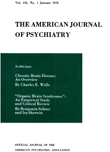REACTIONS TO MUSIC OF AUTISTIC (SCHIZOPHRENIC) CHILDREN
Abstract
Reactions to music of 3 autistic children, 2 of them identical twins, were studied. There is considerable evidence that unique musical reactions constitute a general finding in autistic children. Investigations on 3 autistic children indicate that musical reactions are intimately bound with psychopathology; that reactions consist of a preoccupation and unusual absorption in music, a rote memory for melodies, a preference for singing over speech, a use of singing occasionally as a communicative means but more generally as an expression of an emotional state, and a response to music heard with rhythmical motions and easing of anxiety. There was also some evidence that improvement was associated with a decrease in intensity of interest in music. The possibility that the investigation of such musical reactions might provide further clues to the psychopathology involved, as well as new leads for therapeutic approaches, was discussed.
These preliminary findings indicate a need for further investigation of an important feature in the clinical picture of infantile autism, namely, the reaction to music. Such study might well lead to further understanding of the condition. Determination of exact differences in the reaction of autistic children to music and the reactions of normal children would seem an important part of such a study. The possibility of a therapeutic application of music is suggested, but any statement as to its efficacy would be premature.
Access content
To read the fulltext, please use one of the options below to sign in or purchase access.- Personal login
- Institutional Login
- Sign in via OpenAthens
- Register for access
-
Please login/register if you wish to pair your device and check access availability.
Not a subscriber?
PsychiatryOnline subscription options offer access to the DSM-5 library, books, journals, CME, and patient resources. This all-in-one virtual library provides psychiatrists and mental health professionals with key resources for diagnosis, treatment, research, and professional development.
Need more help? PsychiatryOnline Customer Service may be reached by emailing [email protected] or by calling 800-368-5777 (in the U.S.) or 703-907-7322 (outside the U.S.).



